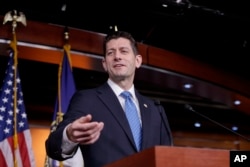The Trump administration has a backup plan to keep the government from defaulting on its financial obligations even if Congress misses an August deadline to raise the debt limit, Treasury Secretary Steven Mnuchin told a congressional panel Monday.
Mnuchin had previously set an August deadline for the federal government to avoid a catastrophic default. Mnuchin said he still prefers that Congress increase the government's authority to borrow before lawmakers leave on a five-week break in August.
However, he said he is "comfortable" that the Treasury Department can meet the government's financial obligations through the start of September. Private analysts say Mnuchin probably has even greater leeway.
"If for whatever reason Congress does not act before August, we do have backup plans that we can fund the government," Mnuchin said without elaborating. "So I want to make it clear that that is not the timeframe that would create a serious problem."
The federal government technically hit the debt limit in March, but Treasury has been using accounting steps known as "extraordinary measures" to avoid a default.
Shortly before Mnuchin testified, a Washington think tank projected that despite the slowdown in revenues, the government will have enough cash to pay its bills until October or November.
The Bipartisan Policy Center says that revenue results from this month's quarterly tax payments could clarify the deadline, but for now it forecasts that Mnuchin has sufficient maneuvering room to keep the government solvent into the fall. The policy center says a big Oct. 2 payment into the military retirement trust fund could trigger default.
As of Friday, the Treasury had a cash balance of $148 billion, down from $204 billion a month ago. The national debt is nearly $20 trillion, including money owed to several federal programs.
Vote on debt limit
Raising the debt limit has become a politically-charged vote in Congress, even though economists believe that an unprecedented default would be catastrophic for the economy. Republicans, who control Congress and the White House, are struggling to come up with a strategy to raise the debt limit, with some GOP members demanding spending cuts in exchange for their vote.
But since Republicans have many members who simply refuse to vote for a debt increase, GOP leaders such as Speaker Paul Ryan of Wisconsin may have no choice but to seek help from Democrats, who are demanding that any debt limit hike be "clean" of GOP add-ons.
Lawmakers are trying to deal with the debt limit while at the same time a House panel is beginning work on spending bills to fund the government.
Republicans controlling the House are taking the first steps to approve President Donald Trump's big budget increase for veterans' health care and the Pentagon.
Spending bill
At stake is an $89 billion spending bill for the Department of Veterans Affairs and Pentagon construction projects that's scheduled for a preliminary panel vote on Monday. The bill would give the VA a 5 percent budget hike for the budget year beginning in October as the agency works to improve wait times and correct other problems.
The Defense Department, meanwhile, would receive a $2 billion, 10 percent increase for military construction projects at bases in both the U.S. and abroad.
"This legislation includes the funding and policies necessary to deliver on our promises to our military and our veterans," said House Appropriations Committee Chairman Rodney Frelinghuysen, a Republican from New Jersey.
Republicans are still struggling to come up with a broader budget that would dictate spending levels for other agencies. Trump has proposed sharp cuts to many domestic agencies and foreign aid as a means to pay for increases for the military. But many GOP lawmakers have already signaled that they disagree with Trump.
Under Washington's arcane budget rules, lawmakers are first supposed to pass an overall fiscal blueprint called a budget resolution before tackling the annual round of spending bills. This year, that budget plan is also the key to unlocking action later this year on legislation to overhaul the tax code, a top GOP priority.
Instead, Republicans are split into three camps on spending: defense hawks who want even more money for the military than proposed by Trump; pragmatists who are defenders of domestic programs; and conservatives who agree with Trump's plan to cut domestic agencies and deliver the proceeds to the Pentagon.
For now, those GOP divisions have meant an impasse for Trump's overall budget and tax agenda.










